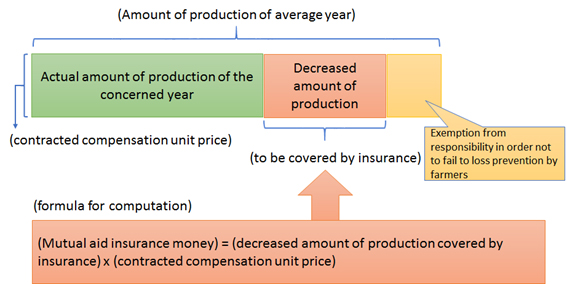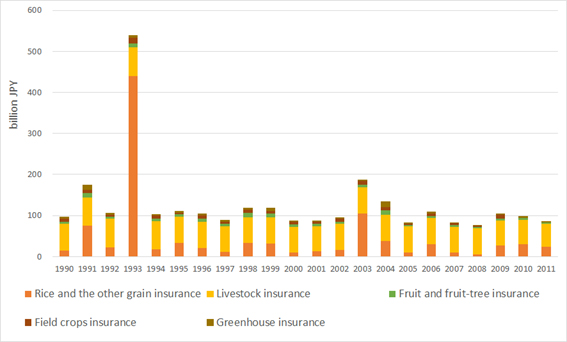Fumihiro Kabuta, Ph.D.
Policy Research Coordinator, Policy Research Institute,
Ministry of Agriculture, Forestry and Fisheries, Japan
(Continued from Part 1 uploaded on April 18, 2014)
7. Mechanism of the compensation (mutual aid insurance money)
Agricultural mutual aid insurance money which multiplies the decreased amount of production and contracted compensation unit price for each farmer, will be paid in case that the amount of production was decreased by natural disaster and accident with the certain percentage or more against that of the average year.

8. Payment records of mutual aid insurance money
Payment of mutual aid insurance money shall be fluctuating depending on whether there are few or many natural disasters for each year. For example, in 1993 due to severe cold weather damage, the total payment mounted to 548.7 billion JPY (of which 438.8 billion JPY was re-reinsured), and in 2003 due to strong typhoon and cold weather damage the total payment mounted to 187.1 billion JPY (of which 111.1 billion JPY). The program has contributed effectively toward stabilizing farm management in Japan.

9. Prior study on agricultural revenue insurance scheme
-
As a safety net measure to stabilize farm management, the insurance scheme with the beneficiary-pays principle would be one of the most promising tools.
-
Current Agricultural Mutual Relief (AMR) program is intended for the harvest losses due to natural disasters, and losses by lower prices could not be covered.
-
Since current AMR program is based on the harvest losses, the coverage of target agricultural products is limited and the program does not cover the risk of farm management as a whole.
-
Therefore, it is necessary to study for the introduction of revenue insurance scheme which would compensate the whole-farm revenue loss due not only to harvest loss, but also to price decrease.
-
In order to design revenue insurance scheme, it is necessary to fully study on the insurance policy design (ex. premium rates and insurance money) based on the related historical data, and method to capture revenue of each farmer.
A study to design revenue insurance scheme as a new safety net for stabilizing farm management shall be conducted.
Budget amount in FY2014: 321 million JPY
Consignee: Private organizations (National Agricultural Insurance Association was entrusted after bidding.)
(Source: Website of Japanese Ministry of Agriculture, Forestry and Fisheries (MAFF) at http://www.maff.go.jp/j/keiei/hoken/saigai_hosyo/ (Japanese only: 2014/04/17).
(End)
|
Date submitted: June 5, 2014
Reviewed, edited and uploaded: June 9, 2014
|


Agricultural Disaster Compensation System in Japan (Part 2)
Fumihiro Kabuta, Ph.D.
Policy Research Coordinator, Policy Research Institute,
Ministry of Agriculture, Forestry and Fisheries, Japan
(Continued from Part 1 uploaded on April 18, 2014)
7. Mechanism of the compensation (mutual aid insurance money)
Agricultural mutual aid insurance money which multiplies the decreased amount of production and contracted compensation unit price for each farmer, will be paid in case that the amount of production was decreased by natural disaster and accident with the certain percentage or more against that of the average year.
8. Payment records of mutual aid insurance money
Payment of mutual aid insurance money shall be fluctuating depending on whether there are few or many natural disasters for each year. For example, in 1993 due to severe cold weather damage, the total payment mounted to 548.7 billion JPY (of which 438.8 billion JPY was re-reinsured), and in 2003 due to strong typhoon and cold weather damage the total payment mounted to 187.1 billion JPY (of which 111.1 billion JPY). The program has contributed effectively toward stabilizing farm management in Japan.
9. Prior study on agricultural revenue insurance scheme
A study to design revenue insurance scheme as a new safety net for stabilizing farm management shall be conducted.
Budget amount in FY2014: 321 million JPY
Consignee: Private organizations (National Agricultural Insurance Association was entrusted after bidding.)
(Source: Website of Japanese Ministry of Agriculture, Forestry and Fisheries (MAFF) at http://www.maff.go.jp/j/keiei/hoken/saigai_hosyo/ (Japanese only: 2014/04/17).
(End)
Date submitted: June 5, 2014
Reviewed, edited and uploaded: June 9, 2014